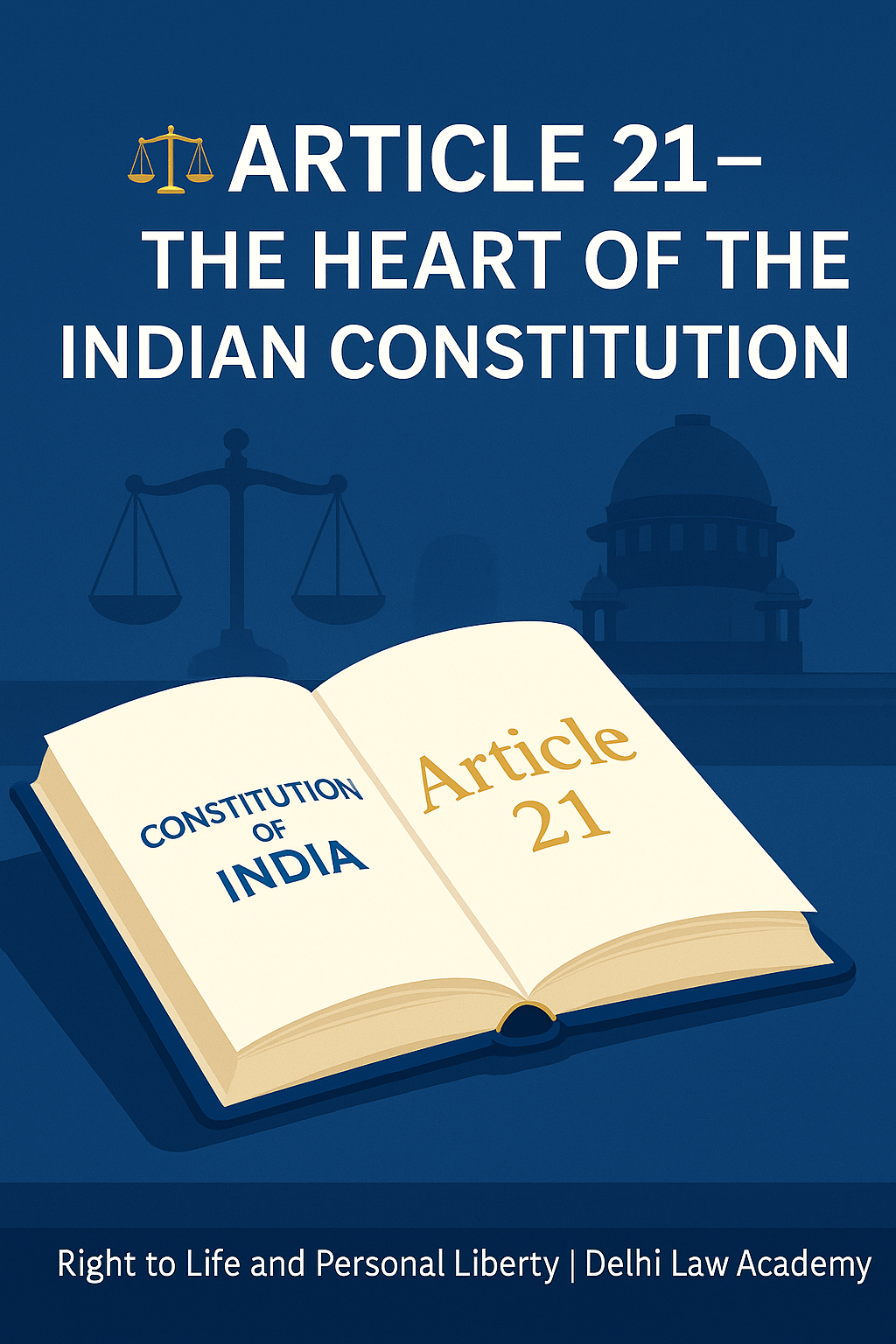
📘 Free Study Material for Law Students!
Download our FREE study material prepared by Delhi Law Academy’s expert faculty.
💬 Frequently Asked Questions on Article 21 of the Indian Constitution
It ensures that every individual has the right to live with dignity, security, and freedom under the law.
But after the Maneka Gandhi v. Union of India (1978) case, the Supreme Court ruled that the procedure must be just, fair, and reasonable.
This gave Article 21 its expanded, humanitarian meaning.
🔒 Right to Privacy, ⚰️ Right to Die with Dignity, 🌿 Right to Clean Environment, 🏥 Right to Health, 💼 Right to Livelihood,
🧠 Right to Be Forgotten, 🏠 Right to Shelter, and 💻 Right to Digital Access.
Each of these rights ensures that life is lived with dignity and freedom.
– Maneka Gandhi v. Union of India (1978)
– Francis Coralie Mullin v. Administrator, Delhi (1981)
– Subhash Kumar v. State of Bihar (1991)
– Paschim Banga Khet Mazdoor Samity v. State of West Bengal (1996)
– Anuradha Bhasin v. Union of India (2020)
These cases collectively gave Article 21 its broad, evolving interpretation.
It touches every aspect of existence and has become the foundation for many other fundamental rights.
Without Article 21, the rest of the Constitution would lose its humane purpose.
Contact us
📍 Delhi Law Academy – Jaipur Branch
6C, Tower 2, Coaching Hub, Pratap Nagar, Jaipur – 302033
📞 Phone:
+91 9911916552
+91 8447285606
✉️ Email:
contactus@delhilawacademy.com
⚖️ Article 21 of the Indian Constitution – The Ever-Expanding Right to Life and Personal Liberty
Among all the Fundamental Rights enshrined in the Constitution of India, none is as profound or far-reaching as Article 21.
It has evolved from a simple protection against arbitrary deprivation of life and liberty into a vast umbrella that covers almost every aspect of human dignity.
📜 Text of Article 21
“No person shall be deprived of his life or personal liberty except according to procedure established by law.”
At first glance, this seems straightforward — it guarantees that the State cannot take away your life or liberty without following a legal process.
But over the decades, judicial interpretation has transformed Article 21 into a living, breathing right that protects every citizen’s dignity, privacy, and well-being.
🧩 Historical Evolution of Article 21
Initially, in A.K. Gopalan v. State of Madras (1950), the Supreme Court interpreted Article 21 narrowly — holding that as long as a law existed, liberty could be curtailed.
However, in the landmark Maneka Gandhi v. Union of India (1978), the Court revolutionized the meaning of “procedure established by law,”
ruling that such a procedure must be just, fair, and reasonable.
This case gave birth to the expanded interpretation of Article 21.
🌐 The Expanding Horizons of Article 21
Through a series of landmark judgments, the Supreme Court has recognized that the Right to Life is not limited to mere physical existence.
It includes the right to live with dignity, privacy, health, safety, and opportunity.
Over time, many specific rights have been derived from Article 21, including:
🏥 Right to Health and Medical Care
Each of these rights has been judicially evolved and recognized as part of the fundamental guarantee under Article 21.
🏛️ Landmark Judgments Under Article 21
⚖️ Maneka Gandhi v. Union of India (1978) – Expanded “procedure established by law.”
💬 Francis Coralie Mullin v. Administrator, Delhi (1981) – Life includes living with human dignity.
🌿 Subhash Kumar v. State of Bihar (1991) – Right to pollution-free environment.
🏥 Paschim Banga Khet Mazdoor Samity v. State of West Bengal (1996) – Right to health and medical care.
📱 Anuradha Bhasin v. Union of India (2020) – Digital access and free speech online.
🌍 Relevance in the 21st Century
Article 21 continues to evolve with modern realities — protecting citizens in fields like data privacy, environment, digital freedom, and medical ethics.
It is no longer just about survival, but about living with dignity and opportunity.
From climate change to AI surveillance, courts have used Article 21 to uphold human dignity in an increasingly complex world.
🎓 About Delhi Law Academy
Delhi Law Academy (DLA) is India’s leading institute for Judiciary Coaching in Delhi and Jaipur.
We simplify complex judgments and constitutional principles for students preparing for Judicial Services Exams (RJS, DJS, etc.).
Through our Know Your Rights series, we aim to make every citizen aware of their fundamental protections under the law.
👉 Visit www.delhilawacademy.com to learn more.

